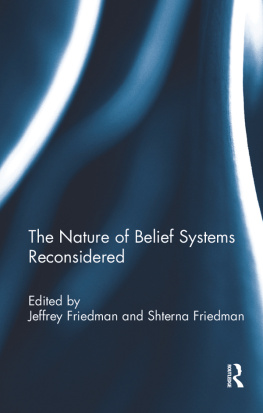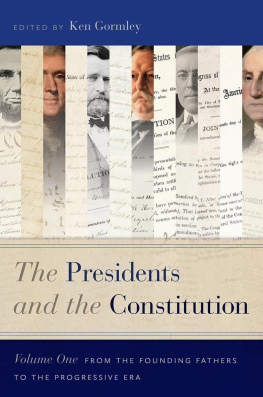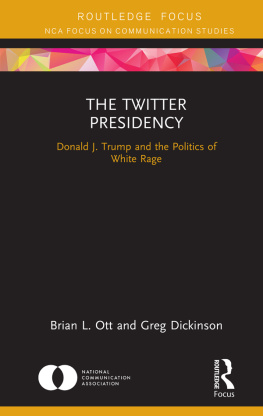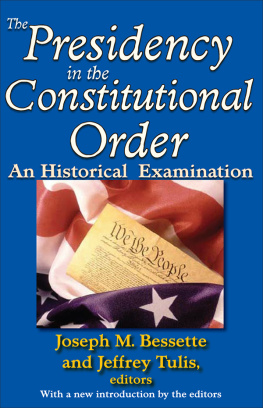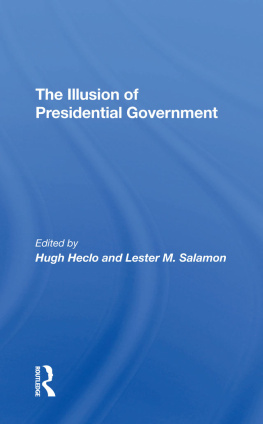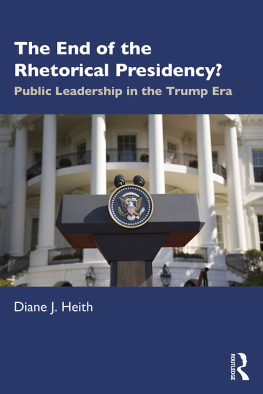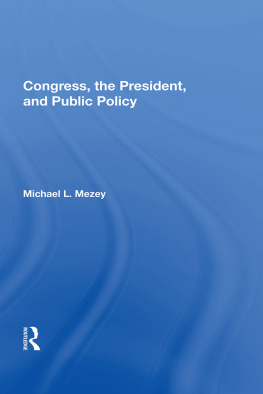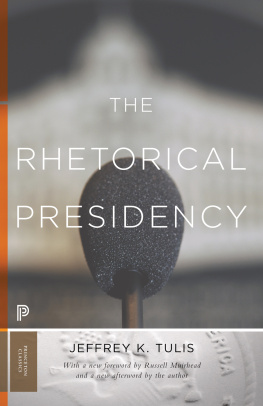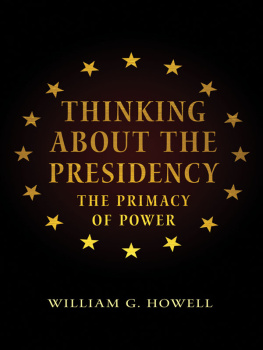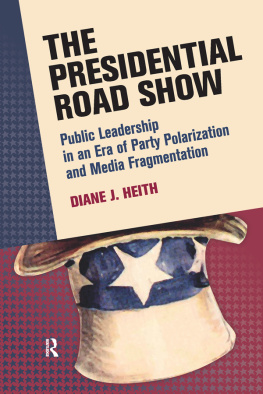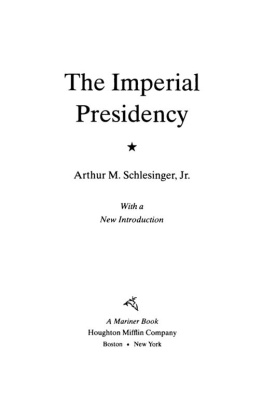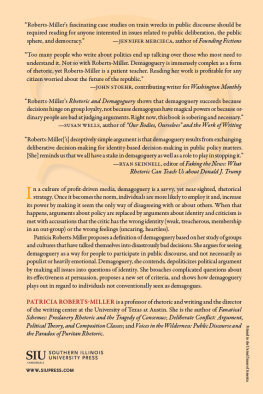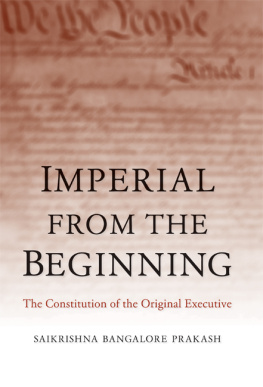Rethinking the Rhetorical Presidency
In The Rhetorical Presidency, Jeffrey Tulis argues that the presidents relationship to the public has changed dramatically since the Constitution was enacted: while previously the president avoided any discussions of public policy so as to avoid demagoguery, the president is now expected to go directly to the public, using all the tools of rhetoric to influence public policy. This has effectively created a second Constitution that has been layered over, and in part contradicts, the original one. In this volume, scholars from different subfields of political science extend Tuliss perspective to the judiciary and Congress; locate the origins of the constitutional change in the Progressive Era; highlight the role of Theodore Roosevelt, Woodrow Wilson, and the mass media in transforming the presidency; discuss the nature of demagoguery and whether, in fact, rhetoric is undesirable; and relate the rhetorical presidency to the publics ignorance of the workings of a government more complex than the Founders imagined.
This book was originally published as a special issue of Critical Review: A Journal of Politics and Society.
Jeffrey Friedman, a visiting scholar in the Department of Government, University of Texas at Austin, received a Ph.D. in Political Science from Yale University. He is the author of Engineering the Financial Crisis (Penn, 2011, with Wladimir Kraus) and the editor of The Rational Choice Controversy: Economic Models of Politics Reconsidered (Yale, 1996), What Caused the Financial Crisis (Penn, 2011), and The Nature of Belief Systems Reconsidered (Routledge, 2012). He is the editor of Critical Review: A Journal of Politics and Society and a co-editor of Political Knowledge (Routledge, 2012, with Shterna Friedman).
Shterna Friedman received an MFA from the Iowa Writers Workshop, University of Iowa. She is managing editor of Critical Review: A Journal of Politics and Society and a co-editor of Political Knowledge (Routledge, 2012, with Jeffrey Friedman).
First published 2012
by Routledge
2 Park Square, Milton Park, Abingdon, Oxon, OX14 4RN
Simultaneously published in the USA and Canada
by Routledge
711 Third Avenue, New York, NY 10017
Routledge is an imprint of the Taylor & Francis Group, an informa business
2012 Critical Review Foundation
This book is a reproduction of Critical Review: A Journal of Politics and Society, volume 19, issues 23. The Publisher requests to those authors who may be citing this book to state, also, the bibliographical details of the special issue on which the book was based.
All rights reserved. No part of this book may be reprinted or reproduced or utilised in any form or by any electronic, mechanical, or other means, now known or hereafter invented, including photocopying and recording, or in any information storage or retrieval system, without permission in writing from the publishers.
Trademark notice: Product or corporate names may be trademarks or registered trademarks, and are used only for identification and explanation without intent to infringe.
British Library Cataloguing in Publication Data
A catalogue record for this book is available from the British Library
ISBN13: 978-0-415-69623-4
Typeset in Times New Roman
by Taylor & Francis Books
Publishers Note
The publisher would like to make readers aware that the chapters in this book may be referred to as articles as they are identical to the articles published in the special issue. The publisher accepts responsibility for any inconsistencies that may have arisen in the course of preparing this volume for print.
Contents
Jeffrey Friedman
Terri Bimes
James W. Ceaser
David A. Crockett
John J. DiIulio, Jr.
Bryan Garsten
Susan Herbst
Kathleen Hall Jamieson & Jeffrey Gottfried
Mel Laracey
Nicole Mellow
Sidney M. Milkis
Thomas L. Pangle
Richard M. Pious
Paul J. Quirk
Diane Rubenstein
Adam D. Sheingate
Jeffrey K. Tulis
Jeffrey Friedman
Jeffrey Friedman, the Max Weber Senior Fellow of the Institute for the Advancement of the Social Sciences, Boston University, and a Visiting Scholar, Department of Government, University of Texas at Austin, thanks Shterna Friedman for research and editing assistance and David Brooks, Dan Greenberg, Dan Klein, J. P. de Kok, Mike Murakami, and Ilya Somin for comments on earlier drafts.
ABSTRACT: The Tulis thesis becomes even more powerful when the constitutional revolution he describes is put in its Progressive-Era context. The public had long demanded social reforms designed to curb or replace laissez-faire capitalism, which was seen as antithetical to the interests of ordinary working people. But popular demands for social reform went largely unmet until the 1910s. Democratizing political reforms, such as the rhetorical presidency, were designed to facilitate change by finally giving the public the power to enact social reforms. The resulting political order has created systemic pressure for policy demagoguery in place of rational deliberation. Mass political mobilization seems to be better achieved by contests of grand principle that pit the well-meaning supporters of obviously needed reforms against villains and conspirators, than by technical discussions of the possibly counterproductive effects of those reforms.
We advocate, not as ends in themselves, but as weapons in the hands of the people, all governmental devices which will make the representatives of the people more easily and certainly responsible to the peoples will.
Theodore Roosevelt (1912a, 120)
No good American denies the desirability of popular sovereignty and of a government which should somehow represent the popular will. While our national institutions may not be the perfect embodiment of these doctrines, a decisive and a resolute popular majority has the power to alter American institutions and to give them a more immediately representative character.
Herbert Croly ([1909] 1911, 24)
Only a very gross substance of concrete conception can make any impression on the minds of the masses. They must get their ideas very absolutely put, and are much readier to receive a half truth which they can promptly understand than a whole truth which has too many sides to be seen all at once.
Woodrow Wilson ([1890] 1952, 20)
How did presidents come to be quasi-religious figures, who (if they are successful) spark the zeal of millions with their visions for the future and their dreams of a better country? How is it that these high-minded aspirations never seem to be fulfilled, that the cynicism of dashed hope afflicts each new generation? Why is the politics of idealism shadowed by the politics of personal destruction?
The Rhetorical Presidency, by Jeffrey K. Tulis, is an essential starting point for answering such questions. It is one of the two or three most important and perceptive works written by a political scientist during the twentieth century, and it is the one that may help the most to explain the pathological aspects of modern politicsnot only in the United States, but in all social democracies. It is an honor to present this volume of reflections on a landmark work in American political development. I thank Tulis and the other symposiasts for agreeing to look back over the course of two decades to see what we have learned since his book first appeared.


